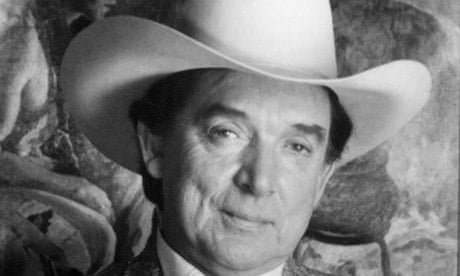Country music entered a golden period after the second world war, as scattered regional styles such as honkytonk, western swing and bluegrass began to coalesce into a Pan-American idiom. One of the leading voices of that era was the singer Ray Price, who has died aged 87. A protege of Hank Williams, he and contemporaries such as Lefty Frizzell and Webb Pierce would create the defining sounds of 1950s country music.
Little more than two years separated Williams and Price, but in 1951 Williams was the biggest name in country music and Price an obscure up-and-comer. Williams liked him and invited him on to his touring show. On occasion, when drink or drugs had rendered the star incapable of performing, Price would take over. Then, in summer 1952, when Williams was sacked from the Grand Ole Opry, Price became the frontman for Williams's celebrated backing band, the Drifting Cowboys. Now an Opry cast member himself, he was as poised as anyone in the business to take Williams's place.
A Texan, Price grew up partly with his mother in Dallas and partly on his father's farm. He served in the war in the US Marines, then resumed veterinary studies at North Texas Agricultural College in Arlington. After a little experience singing on a station in Abilene, he joined the Big D Jamboree, a popular country radio show in Dallas, in 1949 and made his recording debut soon afterwards for the Nashville indie label Bullet. In 1951 he signed with Columbia and roused some interest with Talk to Your Heart.
Though his early recordings were buttressed by the Drifting Cowboys, Price did not aim to be merely a stand-in for Williams. In 1954 he hired a new band, seasoned players from Texas, and called them the Cherokee Cowboys, after the East Texas county where he had been born. They gave his music a tangy western swing flavour, with a distinctive 4/4 shuffle rhythm, that became known as "the Ray Price beat". In later years, the band would be a staging-post for several men on their own journeys through country music, among them Johnny Paycheck, Roger Miller and Willie Nelson.
Price had a good year in 1954 with numbers including Release Me (memorably revived by Engelbert Humperdinck in 1967), I'll Be There and If You Don't, Somebody Else Will, but the songs with which he would forever be linked were Crazy Arms (1956) and City Lights (1958), which both topped the country charts. These and other songs, such as Invitation to the Blues (1958) and Heartaches by the Number (1959), were skilfully drawn maps of the terrain of pain and disappointment, their bleak contours outlined by fiddles and pedal steel guitar. But during the 60s, Price laid aside these essential tools of honkytonk country music and began to consort with violins, recording and even touring with small orchestras. In 1967 he enjoyed a modest pop hit with a revival of Danny Boy.
His fading career was reillumined in 1970 when he had a No 1 hit with Kris Kristofferson's song For the Good Times, which won him a Grammy award. In 1974 he left Columbia Records and by the end of the decade he had more or less retired to his ranch outside Dallas, where he raised horses, but in 1980 he duetted with Nelson on the half-a-million-selling album San Antonio Rose, and their version of the old Bob Wills number Faded Love put him back in the singles chart.
"I worked hard on my instrument over the years," Price once said. "A lot of people don't think of the voice as an instrument, but that's what it is." When he emerged from his semi-retirement in 2007 to tour with Nelson and Merle Haggard, promoting their joint album Last of the Breed, he gave them both what Haggard called "a goddamned singing lesson". The country music historian Charles Wolfe credited Price with "some of the most crystal-pure singing from country music's greatest era".
Price was inducted into the Country Music Hall of Fame in 1996. He is survived by his wife, Janie, and son, Cliff.
